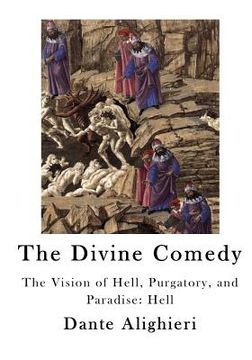Compartir
The Divine Comedy: The Vision of Hell, Purgatory, and Paradise: Hell (en Inglés)
Dante Alighieri
(Autor)
·
Gustave Doré
(Ilustrado por)
·
H. F. Cary M. a.
(Traducido por)
·
Createspace Independent Publishing Platform
· Tapa Blanda
The Divine Comedy: The Vision of Hell, Purgatory, and Paradise: Hell (en Inglés) - Cary M. a., H. F. ; Dore, Gustave ; Alighieri, Dante
$ 28.14
$ 39.09
Ahorras: $ 10.94
Elige la lista en la que quieres agregar tu producto o crea una nueva lista
✓ Producto agregado correctamente a la lista de deseos.
Ir a Mis Listas
Origen: Estados Unidos
(Costos de importación incluídos en el precio)
Se enviará desde nuestra bodega entre el
Martes 16 de Julio y el
Martes 23 de Julio.
Lo recibirás en cualquier lugar de Internacional entre 1 y 3 días hábiles luego del envío.
Reseña del libro "The Divine Comedy: The Vision of Hell, Purgatory, and Paradise: Hell (en Inglés)"
The Divine ComedyThe Vision of Hell, Purgatory, and Paradise: HellDante AlighieriTranslated by The Rev. H. F. Cary, M.A.Illustrated by Gustave DoréThe Divine Comedy (Italian: Divina Commedia is an epic poem by Dante Alighieri, begun c. 1308 and completed 1320, a year before his death in 1321. It is widely considered the preeminent work of Italian literature and is seen as one of the greatest works of world literature. The poem's imaginative vision of the afterlife is representative of the medieval world-view as it had developed in the Western Church by the 14th century. It helped establish the Tuscan language, in which it is written, as the standardized Italian language. It is divided into three parts: Inferno, Purgatorio, and Paradiso.On the surface, the poem describes Dante's travels through Hell, Purgatory, and Paradise or Heaven; but at a deeper level, it represents, allegorically, the soul's journey towards God. At this deeper level, Dante draws on medieval Christian theology and philosophy, especially Thomistic philosophy and the Summa Theologica of Thomas Aquinas. Consequently, the Divine Comedy has been called "the Summa in verse."The work was originally simply titled Comedìa and the word Divina was added by Giovanni Boccaccio. The first printed edition to add the word divina to the title was that of the Venetian humanist Lodovico Dolce, published in 1555 by Gabriele Giolito de' Ferrari.

